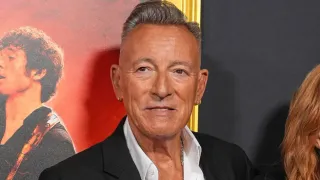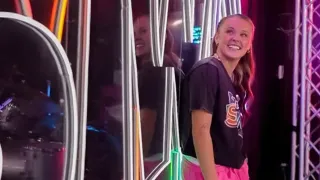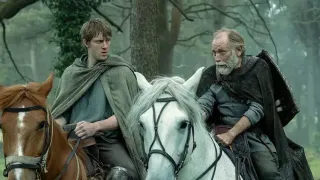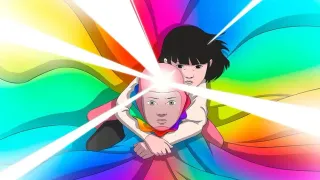June 4, 2017
Redemptive Documentaries
David Lamble READ TIME: 4 MIN.
If you can't afford travel, accommodations or tickets to Sundance, the folks who stage the 16th San Francisco Documentary Festival (aka SF DocFest) have a deal for you. From May 31-June 15, DocFest unspools at SF's Roxie, Vogue and Alamo Drafthouse. A quick glance at their foldout schedule reveals over 50 feature programs at the main venues, plus another six heaping servings of doc shorts. The theme is reconciliation, redemption and the possibility of returning home, all in a punk-rock spirit.
Then there's the parties: The opening-night bash at the DNA Lounge (375 11th St.), where bands include the Pathogens, the Love Songs, Kamala and the Karnivores, and Hammerbombs; Smiths Sing-Along at the Roxie (6/2, 9 p.m.); the Bad Art Gallery returns (518 Valencia, 6/3, 8 p.m.); and Ferris Bueller Bingo, with open bar, prizes, and of course, Bueller! (518 Valencia, 6/10, 9 p.m.)
"Homo the Documentary" Riley Hayes is the point man for a gaggle of idealistic straight youth who convert a van into a mobile film unit and set out across the American heartland to find out why otherwise-intelligent people lose their bearings when it comes to their LGBTQ fellow citizens. The trip comes a year before Supreme Court Justice Anthony Kennedy's historic ruling legalizing same-sex marriage. The trip has its zany moments, including a risibly pompous Bible-thumper who has to be seen to be believed, plus some quirky pit-stops in Mormon country. We discover that, while young people are not always enlightened, they don't seem to feel that queers pose any real threat to their own pursuits of happiness. (Roxie, 6/1, 7)
"Unseen" Laura Paglin presents a real-life horror story that will stay with you. Unfolding in a Cleveland, Ohio hood that appears to have been ground central for the crack cocaine epidemic, the story features a villain right out of central casting, a drug-dealer/pimp who lures 11 African American women to a house in a slum where he tortures and murders them. Painstakingly assembled with survivor and bystander interviews, the film raises disturbing questions about the failure of the American justice system to protect the vulnerable. Using police-gathered footage and chats with witnesses including an immigrant convenience-store owner who raises non-PC concerns, "Unseen" is a pioneering use of the doc medium. It will prick the conscience of any viewer who still possesses one. (Roxie, 6/8, 11)
"Bogalusa Charm" Steve Richardson searches for and finds the hidden virtues of a Louisiana paper-mill town previously known for its stinky air and racial bias. The film opens on "Miss Dixie," a white matron who for 27 years has taken it upon herself to educate young women ages 10-25 on the proper way to carry themselves around the opposite sex. This charm school becomes a device for introducing us to a plethora of "local color." (Roxie, 6/11, 15)
"Resistance is Life" Kurdish filmmaker Apo W. Bazidi tackles his people's struggle to escape ISIS and claim their homeland. Bazidi finds wonderful collaborators in a refugee Kurdish family with an articulate young daughter. As the film informs us, the Kurds, now numbering upwards of 40 million souls spread across four countries (Iran, Iraq, Syria and Turkey), were cheated out of their own piece of real estate by a post-WWI treaty that gave their land to unfriendly neighbors. The film runs down a bit at the end, but provides important ammunition for any just and lasting settlement of the region's ongoing troubles. (Roxie, 6/11, 12)
"Blue Velvet Revisited" I admit to a 30-year love affair with David Lynch's genius work about a boy, a girl and a severed ear. The equally "BV"-besotted German filmmaker Peter Braatz takes 8mm footage, still photos and audio recordings from the original shoot and frames them into a dreamy collage that gets to the heart of what Lynch intended. His surreal nightmare has the 1950s speaking directly to the '80s as if the '70s had never happened. When "Blue Velvet" first appeared, I saw it 11 and a half times, until the projector broke down at screening #12.
Don't miss this sublime reunion with Kyle MacLachlan's Jeffrey Beaumont as he rides in the back seat of evil daddy Dennis Hopper's souped-up death wagon. As Hopper's Frank Booth snarls, "What's this fuck have to do with anything?" we watch in stunned silence as a homoerotic beatdown unfolds between the two men. Queer life will never be the same at the movies. (Roxie, 6/4, 8)
"Nat Bates for Mayor" Bradley Berman and Eric Weiss go behind the scenes of Richmond, CA citizens' ongoing struggle to breath in the shadow of the Chevron oil refinery. (Roxie, 6/10, 15)
"Memories of a Penitent Heart" The niece of a man who died from AIDS before the cocktail creates a moving remembrance with the assistance of an estranged lover. (Roxie, 6/4; Vogue, 6/13)
"Mabel, Mabel Tiger Trainer" Leslie Zemeckis recalls the hair-raising career of a circus wild-animal trainer who gained fame and scars in the Wild West days of circus life in the '20s and '30s. (Roxie, 6/2; Vogue, 6/11)
"End of the Road" The unvarnished story of American war resisters and their Canadian buddies during a time that oddly resembles this one. (Roxie, 6/4, 11)
"Almost Sunrise" Michael Collins and Marty Syjuco follow Iraqi war vets on a healing cross-country journey. The story connects the dots on how a kid's family's military history can provide the spur to join in on a war despite not possessing real "skin in the game." The filmmakers begin with a thoughtful definition: "Moral injury is a wound to the soul, caused by participation in events that violate one's deeply held sense of right and wrong." (Roxie, 6/3; Vogue, 6/10)
Info: sfindie.com






